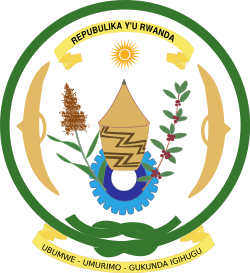Kenya–Rwanda relations
 |
|
Kenya |
Rwanda |
|---|---|
Kenya – Rwanda relations are the bilateral relations between Kenya and Rwanda. Kenya is a strategic partner of Rwanda in many areas, particularly trade, security (military), education, agriculture and energy.[1]
Kenya maintains a high commission in Kigali while Rwanda maintains one in Nairobi.
Post Conflict
It is estimated that there are about 100,000 Rwandese immigrants in Kenya and other states in the African Great Lakes region.
Both countries have on multiple occasions signed various memoranda of understanding. These MOUs involve co-operative technical assistance and development between the two countries.[2]
The Kenyan expat community in Rwanda is the largest among all other expat communities, in terms of sheer numbers.[3]
High-level visits

President Kagame of Rwanda has on multiple occasions made state visits to Kenya. President Uhuru Kenyatta visited Kigali in 2014 where a number of cooperative agreements were made.
Trade
In 2009, Kenya was the leading exporter to Rwanda.[1] In 2013, Kenya was Rwanda's biggest trade partner.[3]
Between the two years, (2009 and 2013), the Kenya Port Authority handled about 3.5 million Dead Weight Tonnage (DWT) of both imports and exports to Rwanda, Burundi and The DRC. Three quarters of this cargo went through Rwanda.[4]
FDI
The Rwanda Development Board (RDB) indicates that Kenya is Rwanda’s top investor and trading partner. As of September 8th 2014 a total of 1,302 Kenyan companies had been registered in Rwanda, with the direct employment from these firms standing at about a quarter million Rwandans.[4]
Since 2000 the RDB records state that 55 Kenyan investors ploughed roughly $400 million into Rwanda. Other Kenyan investors have at various points helped the Rwandan government mobilise close to $1 billion from external sources over the last 15 years.[4]
The largest Kenyan companies in Rwanda are mostly involved in finance and retail. Some of these companies are the KCB Group, the Equity Bank Group, I&M Bank Group and Nakumatt.[4]
Infrastructure
The two countries, together with Uganda, are working on building a standard gauge railway link that would go through Mombasa-Nairobi-Kampala-Kigali. Works began on the Kenyan section of the rail line in December 2014. There have been proposals to have the Mombasa-Nairobi-Kampala-Kigali expanded to a motorway all the way.
Kenya has also been involved in helping Rwanda explore its geothermal energy potential.
EAC membership
On July 1, 2007, Rwanda became a full member of the EAC.[5] Rwanda joined the EAC Customs Union on 6th July 2009 and since then has been a close partner in terms of customs and trade integration.
Coalition of the Willing
The COW, which also includes South Sudan and Uganda, was described as an entity with multiple defence trade and immigration pacts.[6] Even though it is not an official entity these states are described as the states making faster progress towards integration. In 2014 Kenya, Uganda and Rwanda came up with a single tourist visa which would allow tourists to visit all three countries using just one visa. In 2015, all three countries have also abolished work permits for citizens of the three countries.[7]
See also
References
- 1 2 Kenya, Rwanda relations stronger; envoy. Rwandan Patriotic Front. Retrieved January 20, 2015.
- ↑ Rwanda and Kenya to strengthen cooperation. Retrieved January 20, 2015.
- 1 2 Uhuru’s visit a welcome gesture as Kenya and Rwanda strengthen ties. The EastAfrican. November 1 2013. Retrieved January 20, 2015.
- 1 2 3 4 Why Kenyans and their businesses are running to Rwanda. November 5, 2014. Retrieved January 6, 2015.
- ↑ Key dates in the EAC's history. Retrieved January 20, 2015.
- ↑ President Kagame to attend 8th Northern Corridor summit in Nairobi. The New Times. December 11, 2014. Retrieved January 20, 2015.
- ↑ Coalition of the willing emerges again in EAC. The Citizen. January 13 2014. Retrieved January 20, 2015.

